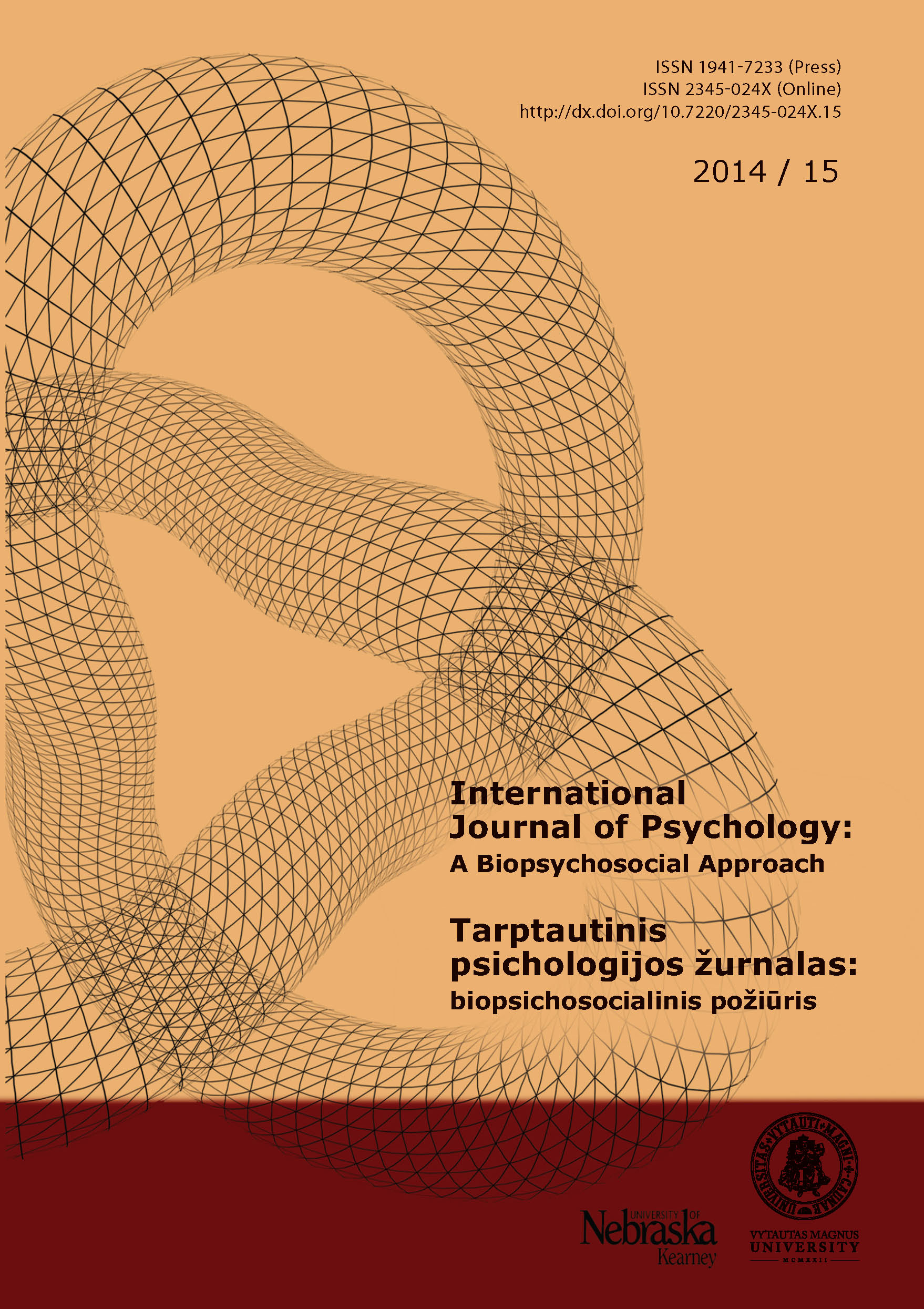Intervencijų, paremtų kognityvine-elgesio terapija, efektyvumas vaikų ir paauglių pykčio ir agresyvaus elgesio kontrolei. Sisteminė literatūros analizė
EFFECTIVENESS OF THE COGNITIVE-BEHAVIOUR THERAPY BASED INTERVENTIONS TO CHILDREN’S AND ADOLESCENTS’ ANGER AND AGGRESSIVE BEHAVIOUR. SYSTEMATIC ANALYSIS
Author(s): Dovilė ValiūnėSubject(s): Social Sciences
Published by: Vytauto Didžiojo Universitetas
Keywords: Intervention; Cognitive-behaviour therapy; Effectiveness; Anger; Aggressive behaviour
Summary/Abstract: Dažnas pyktis ir agresyvus elgesys yra būdingas mokyklinio am¬žiaus vaikams (Reyes ir kt., 2003). Paauglių pykčio kontroliavimo problemos susiju¬sios su įvairiais sunkumais mokykloje (Humphrey, Brooks, 2006; Schwartz ir kt., 2006; Feindler, Engel, 2011). Taigi paauglių pyktis ir agresija lieka svarbia tyrinėjimo pro¬blema mokyklose (Fives ir kt., 2011). Yra nemažai tyrimų, nagrinėjančių intervencijų veiksmingumą pykčiui ir agresyviam elgesiui. Atliktos metaanalizės parodė, kad in¬tervencijos, paremtos kognityvine-elgesio terapija, efektyvios, tačiau daugumoje jų nebuvo atskirai nagrinėjama vaikų ir paauglių populiacija. Taip pat matomas inter¬vencijų efekto dydžių, skaičiuojamų skirtingose metaanalizėse, skirtumas. Dažnai apibendrinami senesni nei 15 metų tyrimai ir pastebima, kad nemažai tyrimų turi vertinimo ir metodologinių trūkumų (Beck, Fernandedez, 1998; Bennet ir kt., 2000; Sukhodolsky, 2004; Saini, 2009; Feindler, Engel, 2011). Taigi akivaizdus poreikis atlikti sisteminę literatūros analizę naujausių efektyvumo tyrimų, kurie apima intervencijas, grįstas kognityvine-elgesio terapija, vaikų ir paauglių pykčiui ir agresyviam elgesiui mažinti. Tyrimo tikslas – išnagrinėti tyrimus, kuriuose analizuojamas intervencijų, paremtų kognityvine-elgesio terapija, efektyvumas vaikų ir paauglių pykčiui ir agre¬syviam elgesiui mažinti, įvertinti poveikio programų efektyvumą ir atrasti šių tyrimų metodologinius skirtumus. Metodika. Sisteminė literatūros analizė. Rezultatai. Ne¬mažai nagrinėjamų tyrimų parodė, kad grupinės intervencijos, paremtos kognityvine-elgesio terapija, nesvarbu, kokia jų trukmė, yra efektyvios paveikiant daugumos vaikų ir paauglių pykčio ir agresyvaus elgesio apraiškas. Tačiau esama prieštaringų rezultatų ir tam tikrų metodologinių trūkumų. Taip pat akivaizdus poreikis nagrinėti aplinkos ir asmenybinių kintamųjų svarbą intervencijų efektyvumui.Aggressive behaviour and anger is frequent among school-aged children (Reyes at al., 2003). Adolescents’ inability to control their anger may be largely related with many problems at school (Humphrey, Brooks, 2006; Schwartz at al., 2006; Feindler, Engel, 2011). Thus, adolescents’ aggression and anger remains important research problem aiming to prevent consequences caused by anger and aggression (Fives at al., 2011). Many investigations analyzing the effect of interventions to anger and aggression have been performed. The results of meta-analyzes have shown that interventions based on cognitive-behaviour therapy are effective but most of the investigations did not analyze separately children’s and adolescents’ population; the difference between the measures of the effect of different interventions counted in various meta-analyzes was not researched; most summarized investigations are often older than fifteen years and most of them tend to have various evaluation and methodological shortcomings (Beck, Fernandedez, 1998, Bennet at al., 2000; Sukhodolsky, 2004; Saini, 2009, Feindler, Engel, 2011). Thus, a need to perform sys-tematic analysis of the literature, encompassing the effectiveness of the cognitive-behaviour therapy based interventions, including most recent investigations, arises. The aim of the research is to carry out systematic analysis of the literature describing the investigations of the cognitive-behaviour therapy based interventions’ influence on children’s and adolescents’ anger and aggressive behaviour. The method applied in the research is systematic analysis of the literature. The results revealed that in most of the cases group interventions based on cognitive-behaviour therapy, disregarding their length, were effective in altering children’s and adolescents’ anger and aggressive behaviour sub-scales’ results. Nevertheless, some controversial results and methodological shortcomings were observed. In addition, the need to analyze environmental and personal variables for intervention effectiveness must be included.
Journal: Tarptautinis psichologijos žurnalas: biopsichosocialinis požiūris
- Issue Year: 2014
- Issue No: 15
- Page Range: 111-131
- Page Count: 21
- Language: Lithuanian

